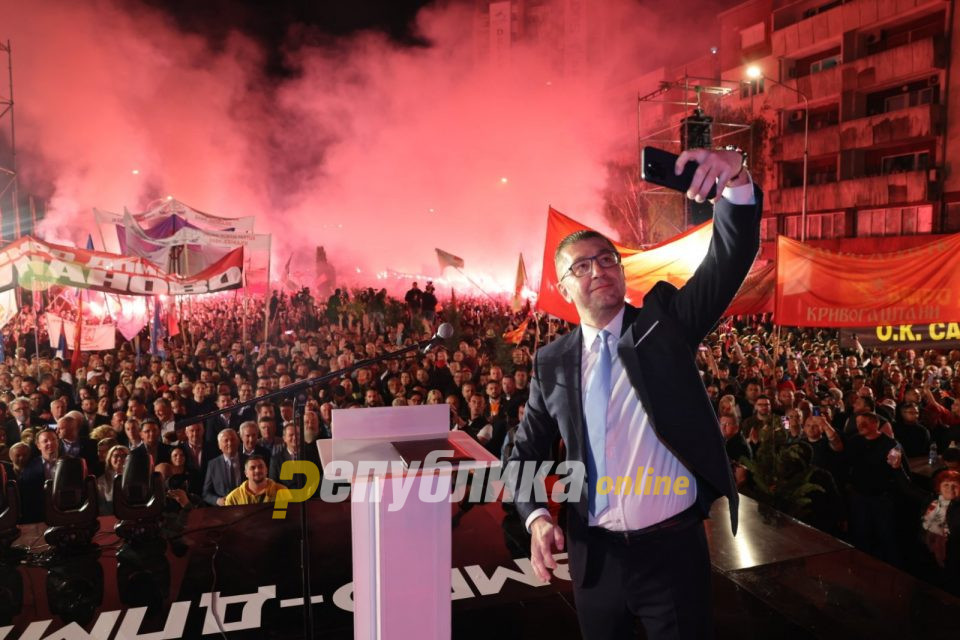“A stable Balkan means a stable Europe.” This is the title of the political analysis published on newsmax.com
In it, a part is dedicated to Macedonia, especially to the leader of VMRO-DPMNE, Hristijan Mickoski.
We provide the full published analysis here.
In the late 1800s, German Chancellor Otto von Bismarck identified the Balkans as an unstable region that could send all of Europe into a disastrous war.
World War I proved him correct.
The poorly resolved conclusion of that conflict set the stage for World War II.
Even to this day, the region is still struggling, as it has since the days of Caesar.
In an era where Europe faces unparalleled challenges, countries in the Balkans find themselves at a pivotal juncture.
The war in Ukraine, now in its third year, has underscored the precarious nature of regional stability. Putin eliminating his principal adversary, Navalny, ahead of orchestrated elections, only intensifies the urgency for a united and resilient Europe.
Amidst this backdrop, the role of each European nation becomes crucial, more so for those at the doorstep of the European Union (EU).
As Europeans go to the polls in 2024, the results of these elections will determine the stability of the continent, especially so in the Balkans.
The region has plenty of frozen conflicts that the Kremlin is poised to exploit, including those between Serbia and Kosovo, the threatening situation regarding Putin’s supporters in Bosnia and Herzegovina, as well as domestic unrest caused by years of corrupt governance in North Macedonia.
Importantly, as North Macedonia gears up for a parliamentary election, the country has a chance to rectify its position, laying a solid foundation for a stable Balkans.
North Macedonia is presented with a crucial choice between two paths.
It can continue along its current trajectory that has seen the country regress and destabilize under the Social Democratic Union of Macedonia (SDSM), or it can choose to steer towards change with the Internal Macedonian Revolutionary Organization — Democratic Party for Macedonian National Unity (VMRO-DPMNE) under a new leader, Hristijan Mickoski.
The tenure of the SDSM has been marred by stagnation and corruption, casting a long shadow over North Macedonia’s aspirations for EU accession.
Despite lofty promises, the SDSM government’s tenure has seen backsliding in crucial areas, with no significant progress towards joining the EU.
This pattern of governance has not only disillusioned the Macedonian public but also raised red flags among potential foreign investors and the EU.
A particularly contentious move from the SDSM was the introduction of a law that effectively shielded many government officials from corruption charges.
This legislative maneuver not only freed numerous officials suspected of engaging in corrupt practices but also signaled a troubling departure from the principles of accountability and transparency.The ramifications of this law have been far-reaching, catalyzing a surge in public discontent and exacerbating distrust in governmental institutions.
Moreover, just recently the U.S. State Department blacklisted and sanctioned the former chief of North Macedonia’s now defunct Special Prosecution, Katica Janeva, in addition to Stevco Jakimovski, the Mayor of Skopje’s Karposh municipality and lately a presidential candidate.
International action was taken because of the aforementioned official’s involvement in high-level corruption — further exposing the extent of SDSM’s mishandling of their administration.
Hence, VMRO-DPMNE offers hope, both domestically and globally.
The call for change is clear, underscored by the palpable frustration of the Macedonian people with the status quo. Polls indicate a growing consensus for a shift in leadership, with VMRO-DPMNE poised to translate public sentiment into actionable governance.
VMRO leader Hristijan Mickoski has demonstrated a profound determination to drive North Macedonia towards a positive change.
Mickoski’s vision is one of robust governance, free from the shackles of corruption, and geared towards economic revitalization through foreign investment.
Moreover, his commitment to fulfilling NATO obligations and accelerating EU accession speaks to a deep understanding of North Macedonia’s strategic imperatives.
This is particularly important given the context of the presidential election upcoming on the other side of the Atlantic, as Former President Donald Trump has repeatedly encouraged NATO allies to meet the 2% defense spending target.
Hence, North Macedonia fulfilling its NATO budget requirement would strengthen not only the Balkans, but the Alliance as a whole.
Meanwhile, the prospects of EU accession would increase under VMRO-DPMNE regardless of Bulgaria’s attempts to veto North Macedonia’s membership.
The new administration would be well-placed to find a compromise with its neighbor, given that Bulgaria itself is troubled with widespread corruption, and deep instability marked by six elections in three years.
Bulgaria’s instability would stand in contrast with North Macedonia’s newfound steadiness, enhancing the prospect of support for the latter from key European decision makers.
Thus, the implications of this election extend far beyond North Macedonia’s borders, echoing throughout Europe.
As the continent grapples with external threats and internal divisions, the path North Macedonia chooses will resonate with profound significance.
The country has a chance to become the first foundational brick for stable Balkans — a tall task that the following administration will have to undertake.




Comments are closed for this post.